Here in the States we just celebrated Mother’s Day and we would like to honor all mothers for the love and sacrifices they make for their children. This week’s blog is a special tribute from a son to his mother and grandmother that tells their story of survival during the German occupation. It also highlights that many, many people in addition to the French struggled under the occupation during the Second World War. All these stories are amazing and valuable pieces of history that should be captured and honored while we still have time. This is our passion at The Girl Who Wore Freedom and we hope it becomes yours.
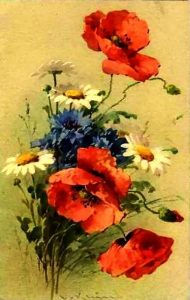 The picture transfixed me. It was Dany Patrix in her freedom dress, a dress made from the parachutes of the American liberators. My mother had such a dress. While in Normandy, Dany’s dress was adorned with the Stars and Stripes, my mother’s dress carried the red, white and blue in the form of symbolic flowers of Luxembourg. The red poppies, the white daisies, and the blue Bachelor Button flowers, also the colors of the Luxembourg flag, were hand painted on the silk.
The picture transfixed me. It was Dany Patrix in her freedom dress, a dress made from the parachutes of the American liberators. My mother had such a dress. While in Normandy, Dany’s dress was adorned with the Stars and Stripes, my mother’s dress carried the red, white and blue in the form of symbolic flowers of Luxembourg. The red poppies, the white daisies, and the blue Bachelor Button flowers, also the colors of the Luxembourg flag, were hand painted on the silk.
The stories of the French’s love affair for the American liberators is so important to remember, both to preserve the stories of sacrifice and gratitude and to document the story for those who can only experience history through a work like this. Just as history shapes a nation, personal family history shapes a person. I am more keenly aware of this now, as I have had the opportunity to listen to my mom fill in a few blanks of the stories she told me during my childhood.
I grew up in a town in rural NW Ohio where family history was valued. Generations of families had deep roots in the area, and one could tell what area of the county you were from by your last name. However, our name meant nothing to the locals; we were foreigners. Not only were we first generation to NW Ohio, but I was a first generation American on my mother’s side.
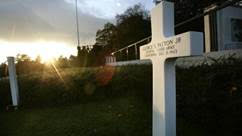 While many of those from where I grew up never saw much of the world beyond Ohio’s borders, I spent my youth taking multiple summer trips back to my motherland of Luxembourg to visit my extended family. It was over the course of my upbringing on these trips that I was able to learn about this history first hand. By the time I was eight, I had seen everything from Luxembourg to Bastogne to Versailles, and it was always a ‘must stop’ to visit General Patton’s grave at the Luxembourg American Cemetery and Memorial outside of Luxembourg City. Ettelbruck in Luxembourg was also a favorite stop of the family so that I could have my picture taken with the Patton Monument in the town.
While many of those from where I grew up never saw much of the world beyond Ohio’s borders, I spent my youth taking multiple summer trips back to my motherland of Luxembourg to visit my extended family. It was over the course of my upbringing on these trips that I was able to learn about this history first hand. By the time I was eight, I had seen everything from Luxembourg to Bastogne to Versailles, and it was always a ‘must stop’ to visit General Patton’s grave at the Luxembourg American Cemetery and Memorial outside of Luxembourg City. Ettelbruck in Luxembourg was also a favorite stop of the family so that I could have my picture taken with the Patton Monument in the town.
It was during these excursions that I learned who I really was. I learned about how my mother and grandparents endured the hardships of the war, both as residents of occupied Luxembourg and as a reluctant soldier in the German Wehrmacht.
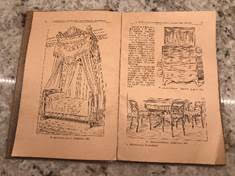 My mother’s father was born in Quint, Germany. As a young child, his family emigrated from Germany to Luxembourg to find a better life for themselves. He grew up as a Luxembourger, attended school, trained as a carpenter, and built beautiful furniture some of which adorns our family home in Chicagoland today. He got married to a Luxembourg woman and had a beautiful daughter, whom I call mom. All this he did without thought of naturalizing as a Luxembourger. In those days, countries’ borders were fluid and the requirements for naturalizing as a citizen were less of an issue than it is now. However, if had he naturalized, this story may never have been written.
My mother’s father was born in Quint, Germany. As a young child, his family emigrated from Germany to Luxembourg to find a better life for themselves. He grew up as a Luxembourger, attended school, trained as a carpenter, and built beautiful furniture some of which adorns our family home in Chicagoland today. He got married to a Luxembourg woman and had a beautiful daughter, whom I call mom. All this he did without thought of naturalizing as a Luxembourger. In those days, countries’ borders were fluid and the requirements for naturalizing as a citizen were less of an issue than it is now. However, if had he naturalized, this story may never have been written.
As Germany’s Blitzkrieg rolled across western Europe in 1940, my family was trying to maintain a sense of normalcy despite the German occupation. Eventually, as many did, my grandparents moved in with family. My grandfather’s parents lived outside of Luxembourg City and together they attempted to ride out the occupation together. When the United States formally took up arms alongside the rest of the allies in 1941, Hitler sought troops from occupied territories to fight on the eastern front. For Luxembourg, that meant that in August of 1942, men of German descent were “forcibly conscripted” to fight in the Wehrmacht. Forcibly conscripted, I guess, is a euphemism for “come fight our war or we’re going to shoot you, your wife and your child.” Having never naturalized as a Luxembourger, my grandfather, who was by then also a new father, had no choice but to fight for a country he never knew, and fight for a leader he did not support.
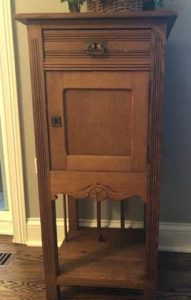 The difficult times became worse when the Germans also conscripted Luxembourg young men. People were trying to hide their “boys” but the Nazis were very good at finding them. They would drive pitchforks into hay piles in the countryside, flushing out the boys who were trying to hide there. Most of the time, the boys were then shot on the spot. Hate for Nazis and anyone of German descent grew. This caused even more hardship for my grandmother, who continued to live near Luxembourg City, where neighbors turned against them. Looters broke into their home and threatened to steal family treasures, such as the furniture that my grandfather had built. Finally, the Mayor of the town stepped in saying, “These are Luxembourgers too! We don’t do this to each other.”
The difficult times became worse when the Germans also conscripted Luxembourg young men. People were trying to hide their “boys” but the Nazis were very good at finding them. They would drive pitchforks into hay piles in the countryside, flushing out the boys who were trying to hide there. Most of the time, the boys were then shot on the spot. Hate for Nazis and anyone of German descent grew. This caused even more hardship for my grandmother, who continued to live near Luxembourg City, where neighbors turned against them. Looters broke into their home and threatened to steal family treasures, such as the furniture that my grandfather had built. Finally, the Mayor of the town stepped in saying, “These are Luxembourgers too! We don’t do this to each other.”
When my family heard through the hidden radios that the allies were beginning to win battles in Northern Africa and in Italy, they began to make plans to hide my grandfather when he came back to Luxembourg on a short pass. Hoping that the war would be over soon, they were willing to do anything to keep him from returning to battle. However, the worse the war was going for the Germans, the more frantic they became. My grandfather knew that if he deserted, the Nazis would come looking for him, and his family would be in danger of going to a concentration camp or worse, being executed. He made the difficult choice to spare his family, and he returned to the eastern front.
The rest, as they say, is history… Operation Overlord was a success. Our boys worked their way across the beaches of Normandy and slowly took back the land taken during the Blitzkrieg. As the war deteriorated for Hitler on the west front, things were becoming bleak to the east as well. During these final months of the war, my grandfather was captured. He was taken POW somewhere in what was then the Soviet Union. Many years later, my grandmother received a letter from a former fellow prisoner who had been sent home from the work camp near Riga in Russia. According to this man, my grandfather’s education as a carpenter probably afforded him reasonable treatment, but that it was best to stop trying to find him. Every time the Russians suspected that a prisoner’s location was discovered, they would move him so that they could deny that he was there. After receiving that letter, my grandmother stopped trying to find her husband.
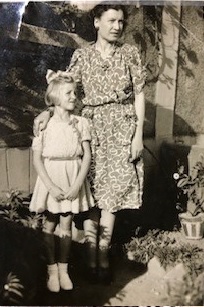 After the occupation was over, the Luxembourgers, like my mother and grandmother, sought to find a new sense of normalcy. It started with watching the Germans retreat and then meeting a new group of soldiers, the American GIs. In one of my favorite stories, a drill sergeant was leading his men through the daily calisthenics in a nearby cow pasture. Nearby, a little blond-haired Luxembourg girl mirrors their movements. Suddenly she starts yelling at him. He, of course, couldn’t understand her and went on leading his men through the drill. This persistent little girl, my mom, ran over and pulled the sergeant’s sleeves to get his attention, pointing out the piles of manure in which his men were told to do their push-ups. The drill sergeant moved his men to a clearer area to continue. The following morning, one of the GIs gave her a piece of chocolate to say thanks for helping them out of a ‘messy’ spot. So yeah, those stories you read and have seen about GIs giving kids chocolate… it’s true. All of it.
After the occupation was over, the Luxembourgers, like my mother and grandmother, sought to find a new sense of normalcy. It started with watching the Germans retreat and then meeting a new group of soldiers, the American GIs. In one of my favorite stories, a drill sergeant was leading his men through the daily calisthenics in a nearby cow pasture. Nearby, a little blond-haired Luxembourg girl mirrors their movements. Suddenly she starts yelling at him. He, of course, couldn’t understand her and went on leading his men through the drill. This persistent little girl, my mom, ran over and pulled the sergeant’s sleeves to get his attention, pointing out the piles of manure in which his men were told to do their push-ups. The drill sergeant moved his men to a clearer area to continue. The following morning, one of the GIs gave her a piece of chocolate to say thanks for helping them out of a ‘messy’ spot. So yeah, those stories you read and have seen about GIs giving kids chocolate… it’s true. All of it.
Listening to my mother tell of her father’s sacrifice formed me in ways that I cannot measure. What my mother and grandmother endured is something so foreign to our experience, but that heritage gives me a great sense of appreciation for the freedom many of us take for granted. When my mother was born in 1941 in Luxembourg during the German occupation. It’s hard for us to imagine the amount of control the occupying forces could exert over the townspeople. All babies born during the occupation had to be given German names. My grandparents intended to name my mom Marguerite that was far too French to the Nazis’ liking but “Ritta” was approved. After the liberation, Luxembourgers allowed children who were forced to take Germanic names to change their names. Few made any changes because these children had grown accustomed to their names. It was easy enough, however, for my grandparents to change the spelling of my mom’s name from “Ritta” to “Rita.” Not quite as French as “Marguerite,” but it was still a heck of a lot less German.
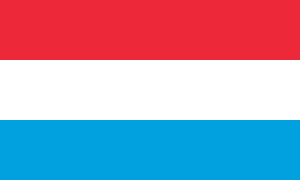 Over the years, as I learned my history and began to understand these stories at levels far deeper than the young child who first heard them, I too changed my name. In honor of a grandfather whom I never met, a man who did what he had to do in order to spare his family and in honor of what my family went through during the Luxembourg occupation. I changed my birth name of “Scott” to “Scot.” I figured if one ‘t’ was good enough for my mom, it would be good enough for me.
Over the years, as I learned my history and began to understand these stories at levels far deeper than the young child who first heard them, I too changed my name. In honor of a grandfather whom I never met, a man who did what he had to do in order to spare his family and in honor of what my family went through during the Luxembourg occupation. I changed my birth name of “Scott” to “Scot.” I figured if one ‘t’ was good enough for my mom, it would be good enough for me.
That’s a bit of my story. It amazes me as I sit here typing how the world has brought me to this place and to be connected with this project. The western front of the European theater has always been a story close to my soul. However, as I type I have to question the coincidence of a friend of mine starting a conversation with a stranger in a foreign country leading to The Girl Who Wore Freedom and the fact that just 340 miles to the east, at the same time, my mom was also another little girl “wearing freedom.”


Recent Comments